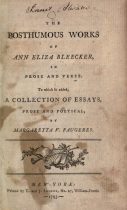
Margaretta Faugères, daughter of John and Ann Eliza Bleecker, was born in New York City in 1771. After her birth, the family move their country estate in Tomhannock, presently known as Troy, New York. After the death of Ann Eliza Bleecker in 1783, twelve-year-old Faugères and her father moved back to New York City. There, Faugères continued her education, and with privilege from her wealth and class, she was able to establish herself as a female writer. Faugères actively participated in the publishing world, starting in the 1790s where she began to write “poems and essays against the death penalty, and in support of abolition and of the French Revolution,” and was named the premier poet of The New York Magazine for several years (Vietto 565). She was genuinely convinced of the restoration of human liberty embodied by the American and French Revolutions. Faugères greatly supported the anti-slavery movement, and in June 1791, she published her political essay, Fine Feelings Exemplified in the Conduct of a Negro Slave, in which she challenged Thomas Jefferson’s claim that slaves lacked “finer feelings;”
I cannot help thinking that their sensations, mental and external, are as acute as those of the people whose skin may be of a different colour; such an assertion may be bold, but facts are stubborn things and had I not them to support me, it is probable I should not attempt to oppose the opinions of such an eminent reasoned. (Faugères 268)
In 1793, Faugères published a collection of her and her mother’s work, titled The Posthumous Works of Ann Eliza Bleecker to which is added, A Collection of Essays, Prose, and Poetical by Margaretta Faugères in The New York Magazine. In this collection, she included her poem “The Hudson,” which she depicts the democratic ideal, as well as the events before and during the American Revolution. She constructed her own identity “as an activist writer of more of an enlightened generation” (Vietto 564). French physician, Peter Faugères influenced her support of the French Revolution. Margaretta and Peter shared similar political beliefs, and although her father was in opposition to their relationship, they got married on Bastille Day, July 14, 1792. They had two daughters, Eveanna Electa Faugères (1795–1841) and Margaret Mason Faugères (1797–1820). Unfortunately, the Faugères’ marriage was broken as her husband abused her and managed to spend her large fortune. When Peter Faugères died of Yellow fever in 1798, Faugères decided to teach school in New Brunswick, New Jersey and Brooklyn, New York (Harris 129).
In 1793, Margaretta Faugères published The Posthumous Works of Ann Eliza Bleecker in Prose and Verse, to which is added a Collection of Essays, Prose and Poetical, a collection of her mother’s work and her own. Faugères expressed grief over the death of her mother and sister in some of her work but proposed democratic ideals in a number of her political essays and poems regarding equality and justice. In 1795, she wrote Belisarius: A Tragedy to the John Street Theatre, a tragedy in four acts, which echoed her views on human rights. At first, it was rejected but was then published in New York that same year and became one of Faugères’s most significant literary achievements. The message of pacifism, anti-materialism, and the vanity of power was extraordinary for this time especially coming from a female author. In similarity to French politics, Belisarius is caught between corrupt courtiers on the one hand and cruel revolutionists on the other. The play exploits the vanity of fame while preserving the purity of ordinary human life.
In 1797, she wrote “The Ghost of John Young,” a six-page poetic narrative in which she gave John Young’s perspective from the grave. The pamphlet presents opposition to capital punishment as she felt it was “a view of rescuing his memory from obloquy and shewing how inconsistent sanguinary laws are, in a country which boasts of her freedom and happiness” (Harris 127). Faugères published her last work, “Ode,” on July 4, 1798, which was composed to support a speech given by New York Governor George Clinton to remind America of the price paid during the Revolution to become a free nation. Margaretta Faugères died on January 9, 1801, and is buried next to her father in the Bowery Methodist Church Cemetery of Brooklyn.
Works Cited
Faugères, Margaretta V. (Ed.). The Posthumous Works of Ann Eliza Bleecker to which is added, A Collection of Essays, Prose, and Poetical, by Margaretta V. Faugères. New York: T and J. Swords, 1793. Evans Early American Imprint Collection, https://quod.lib.umich.edu/e/evans/N19358.0001.001/1:14.2?rgn=div2;view=fulltext. Accessed 20 Nov. 2017.
Harris, Sharon M. Executing Race: Early American Women’s Narratives of Race, Society, and the Law, Ohio State University Press, 2005, pp. 80-130. Print.
Vietto, Angela. “Daughters of the Tenth Muse: New Histories of Women and Writing in Early America.” Early American Literature, vol. 41, no. 3, 2006, pp. 555–567. JSTOR, JSTOR, www.jstor.org/stable/25057469. Accessed 28 Nov. 2017.
“Biography of Margaretta Bleecker Faugères.” Poem Hunter, https://www.poemhunter.com/margaretta-bleecker-faug-res/biography/. Accessed 18 Nov. 2017.